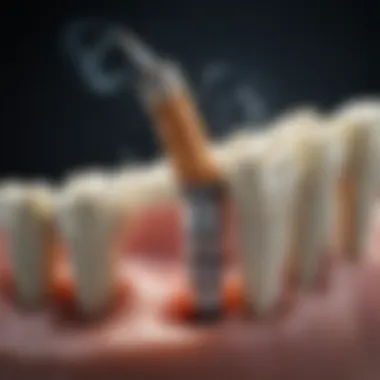Smoking and Dental Implants: Risks and Considerations


Intro
The interplay between smoking and dental implants presents a complex yet critical area of concern for dental professionals and patients alike. As more individuals opt for dental implants to enhance their oral health and functionality, understanding how smoking affects the success of these procedures becomes paramount. This article delves into various aspects of this issue, including the negative consequences of smoking on oral health, specific risks present after implant placement, and strategies for managing these risks.
Research Highlights
Key Findings
Research has demonstrated a clear link between smoking and compromised dental implant success rates. Notably, smokers face a higher likelihood of implant failure due to several factors, including:
- Reduced blood flow to the gums, which hinders healing.
- Increased risk of infection caused by diminished immune response.
- Higher rates of peri-implantitis, an inflammatory condition that affects the surrounding gum tissue.
Such findings underscore the necessity for dentists to assess a patient's smoking habits prior to implant surgery. Moreover, post-operative counseling about the dangers of smoking can significantly boost the prospects for successful outcomes.
Implications and Applications
The implications of these findings are profound, influencing clinical practices and patient behaviors. For instance, dental professionals may need to adopt a more rigorous pre-surgical assessment protocol focused on smoking status. They should also provide tailored cessation resources to guide patients through the quitting process before and after receiving implants. Evidence suggests that even short-term cessation can enhance healing and implant survival rates, highlighting the need for effective communication and education surrounding this topic.
Methodology Overview
Research Design
The insights presented in this article derive from a systematic review of existing literature concerning the effects of smoking on dental implant success. This comprehensive examination includes clinical trials, cohort studies, and meta-analyses highlighting smoking's adverse influences on oral health and surgical outcomes.
Experimental Procedures
Studies reviewed encompassed various methodologies, such as:
- Longitudinal studies tracking implant success rates over time among smokers versus non-smokers.
- Surveys assessing patient compliance with post-operative care instructions in relation to smoking habits.
- Clinical assessments measuring the prevalence of peri-implant diseases among different populations.
These experimental procedures provide a multifaceted understanding of how smoking impacts both immediate and long-term dental health outcomes.
"The relationship between smoking and dental implants is complex, highlighting a need for focused patient education and preventative strategies."
Through this article, readers will gain valuable insights into the significance of considering smoking as a critical factor in the dental implant process.
Intro to Dental Implants
Understanding dental implants is crucial for anyone considering them as a restorative dental option. Dental implants provide a stable foundation for replacement teeth. They are important in dentistry because they allow for improved function and aesthetics in patients who have lost natural teeth.
These implants can replace single or multiple teeth and can significantly enhance a person’s quality of life. Patients often experience improved confidence and comfort. Additionally, they can prevent bone loss in the jaw, a condition that can arise when teeth are lost.


However, it’s equally vital to consider how certain lifestyle choices, such as smoking, may affect the success of dental implants. This article explores that relationship in detail.
By highlighting the importance of dental implants and their proper maintenance, we can illuminate potential challenges faced by smokers. Exploring the types of dental implants provides a solid background for understanding how each one may be impacted by smoking.
The Impact of Smoking on Oral Health
Understanding the impact of smoking on oral health is crucial for anyone considering dental implants. Tobacco usage prioritizes a range of oral issues that could hinder the success of any dental procedure. Implicit in this discussion is the need to consider the negative effects on the healing process and overall oral environment. The implications stretch beyond simple aesthetics; they affect long-term wellbeing and the longevity of dental implants.
Effects of Tobacco on Oral Tissues
Tobacco affects oral tissues significantly. When a person smokes, the chemicals in tobacco contribute to reduced blood flow in gums. This hampers crucial nutrients and oxygen from reaching oral tissues. As a result, gum tissue becomes weaker, making it more susceptible to infection and complications after surgery. Furthermore, smoking also causes the mouth to become dry. This dryness may lead to an increase in harmful bacteria, exacerbating existing oral issues.
Among the array of oral conditions, smokers may experience slow healing of wounds. Given how important healing is for the success of dental implants, smokers face a higher risk of complications. The quality of gum tissues post-surgery is vital. Low-quality healing can lead to poor integration of dental implants.
Smoking and Periodontal Disease
Further complicating matters, smoking is a leading risk factor for periodontal disease. Studies continually link smoking with an increased incidence of gum disease among patients. Smoking allows harmful bacteria to flourish, ultimately leading to inflammation and progressive gum decay.
In cases where patients already have gum disease before obtaining dental implants, the prognosis can become increasingly grim. This condition complicates periodontal healing which can directly result in dental implant failure. Smokers who wish to have a successful implant procedure should prioritize their oral health and work diligently to reduce the risk of periodontal disease.
Association with Oral Cancer
One cannot dismiss the serious concern of oral cancer when discussing smoking and oral health. Numerous studies showcase a strong correlation between tobacco use and an increased risk of developing oral cancers. The presence of carcinogenic substances in tobacco can damage cells in the mouth and throat, leading to mutations that result in cancer.
Given this association, smokers who are considering dental implants should have an open and honest conversation with their dental healthcare provider about their smoking habits. Understanding the links between smoking, oral cancer, and the overall treatment plan is essential for making informed decisions regarding dental care and implantology.
"Smoking not only jeopardizes the oral tissues but also complicates any future dental interventions."
Recognizing these implications can assist dental professionals in providing tailored advice to smokers and reinforcing the importance of smoking cessation. The journey toward maintaining oral health becomes paramount when one considers dental implants.
Smoking and Dental Implants: A Critical Review
Understanding the relationship between smoking and dental implants is crucial for both dental professionals and patients alike. The implications of smoking on the success rates of implants, along with the associated complications, necessitate a critical examination. This section aims to encapsulate significant studies and findings, thus fostering a comprehensive outlook on smoking's effects in the realm of dental implants. This review intends to draw attention to essential considerations, including how smoking modifies healing processes, the potential for implant failure, and the overall efficacy of implants in smokers.
Studies on Implant Success Rates Among Smokers
Research indicates that smoking can adversely affect implant success rates. Multiple studies have shown that smokers experience a higher rate of implant failure compared to non-smokers. One such study published in the Journal of Oral Implantology found that implant survival in smokers was markedly lower at five years post-operation—approximately 10% less than that for non-smokers. The underlying factors can include impaired blood flow, which hinders healing, and increased levels of bacteria in the oral cavity. Such statistics underscore the necessity for clinicians to discuss smoking's risks with patients considering implants.
Possible Complications Linked to Smoking
Delayed Healing Process
The healing process following dental implant surgery is critical for long-term success. In smokers, this healing period can be significantly prolonged. Nicotine constricts blood vessels, leading to reduced oxygen levels at the surgical site. This lack of oxygen slows tissue regeneration and can lead to complications. The prolonged healing prolongs discomfort and complicates post-operative care, making it essential to consider smoking cessation as a part of pre-surgical preparation.


Risk of Implant Failure
Studies consistently show that the risk of implant failure is higher among smokers. Factors such as poor oral hygiene, diminished bone density, and reduced healing capacity contribute to this phenomenon. A comprehensive review in the International Journal of Oral & Maxillofacial Implants tracked implant failures and concluded that smokers had nearly twice the risk of implant failure compared to non-smokers. Therefore, understanding these risks can help dental care providers make informed decisions regarding implant surgery in smokers.
Infection Rates
Smoking elevates infection rates significantly, which can complicate recovery. The introduction of bacteria into the oral environment, paired with the inflammatory effects of smoking, creates a breeding ground for potential infections at the surgical site. According to research, smokers can have infection rates increased by up to 20% following implant procedures. This accentuates the importance of thorough patient education and preventive measures prior to surgery to mitigate potential complications.
Revision of Implant Protocols for Smokers
Given the documented risks associated with smoking, it is imperative to revise implant protocols for smokers. Dental professionals are encouraged to implement tailored strategies focusing on patient education, emphasizing the necessity for smoking cessation prior to surgery and throughout the healing process. Specific protocols might include
- Monitoring healing closely: Regular follow-ups to assess healing progress
- Antibiotic prophylaxis: To reduce the risk of post-operative infection
- Customized post-operative care: Utilizing techniques that enhance recovery for smokers.
In summary, acknowledging and addressing the implications of smoking on dental implant success is vital for ensuring better outcomes and patient satisfaction.
Guidelines for Smokers with Dental Implants
The subject of guidelines for smokers with dental implants holds significant relevance in the broader discourse surrounding oral health. Individuals who smoke face particular challenges during the process of receiving dental implants due to the adverse effects of tobacco on healing and integration. Addressing these unique concerns can help improve overall outcomes for smokers undergoing such procedures. Therefore, establishing clear and practical guidelines is essential for both practitioners and patients alike. Such guidelines aim to minimize risk and enhance success rates while promoting better long-term oral health.
Pre-Operative Advice for Smokers
Smoking Cessation Recommendations
Smoking cessation is a crucial pre-operative measure for individuals with dental implants. The impact of smoking on blood flow and healing cannot be understated. Research has shown that smoking contributes to a significantly reduced success rate of dental implants. To encourage better outcomes, healthcare providers should strongly recommend quitting smoking before undergoing the procedure. This recommendation is based on the understanding that cessation allows the body's natural healing mechanisms to function optimally.
A key characteristic of smoking cessation is that it can be achieved through various means. Options include nicotine replacement therapies, prescription medications, and counseling services. Each of these methods has its own advantages and can be tailored to fit individual needs. The unique aspect of cessation programs is that they not only focus on the act of quitting but also address underlying behavioral patterns which contribute to smoking. This holistic approach can lead to a higher likelihood of long-term success.
Timing of Implant Surgery
Timing is another critical factor when discussing dental implant surgeries for smokers. It is advisable to schedule the procedure at a point where the patient has refrained from smoking for a period of time. This interval allows healing to begin before the surgical intervention. Studies suggest that a cessation period of at least two weeks prior to surgery can significantly reduce complications.
The essential characteristic of proper timing lies in its preventive nature. This proactive approach minimizes the risk of complications such as infection and implant failure. Consequently, patients tend to experience a smoother recovery process. However, the downside is that not all smokers may find it easy to adhere to cessation recommendations, which can delay the necessary timeframes for surgery.
Post-Operative Considerations
Post-Surgery Care Instructions
Post-surgery care is vital for ensuring the success of dental implants, especially for smokers. Instructions typically include avoiding tobacco use in the immediate post-operative period to allow the implant site to heal properly. Smokers are at an elevated risk of complications, so following care instructions is essential. These instructions often emphasize maintaining good oral hygiene, watching for signs of infection, and modifying diet to promote healing.
The primary feature of these care instructions is their specificity. Tailored guidelines typically aim to meet the needs of individual recovery scenarios. By focusing on careful monitoring and proactive self-care, patients can greatly increase the chances of successful integration of the implants. On the downside, non-compliance with these instructions can lead to increased risks of implant failure.


Follow-Up Appointments
Follow-up appointments are integral to the post-operative care plan for smokers. Regular check-ups allow dental professionals to monitor the healing process and spot any potential complications early. They serve as a checkpoint for assessing the success of the procedure during the critical healing phase.
Maintaining these appointments is beneficial as they provide both reassurance to the patient and critical information to the dentist regarding the condition of the implants.
The unique aspect of follow-up appointments lies in their ability to facilitate open communication between the patient and dentist. Patients can discuss their experiences and any complications they may notice. However, missed appointments can hinder the recovery process and lead to an increased likelihood of problems arising.
Smoking and its Economic Impact on Dental Implant Procedures
Understanding the economic implications of smoking when it comes to dental implants is pivotal. For individuals undergoing dental implant procedures, the financial burden extends beyond the initial cost of the surgery. It encompasses potential complications arising from smoking that could lead to increased expenses. By evaluating these factors, both dental professionals and patients can better navigate the financial landscape related to dental implant surgery.
Cost Implications of Complications
Smoking is known to complicate the dental implant process significantly. When a patient smokes, there is a higher risk for several adverse effects. These complications often lead to additional costs, including:
- Increased healing time: The presence of nicotine restricts blood flow, which can delay the healing of implant sites.
- Higher infection rates: Smokers are more susceptible to infections post-surgery, necessitating further medical intervention.
- Potential product replacements: If an implant fails, patients may need to undergo a full replacement procedure, adding to the overall financial burden.
These factors create a chain effect, potentially leading to escalating costs over time. Therefore, it is crucial for patients to understand how these complications can affect their financial standing and to discuss these risks openly with their dental professionals.
Insurance Coverage and Smoking Status
Insurance policies often consider smoking status when determining coverage for dental procedures. Individuals who smoke may face:
- Higher premiums: Some insurance plans may charge higher rates for smokers due to their increased health risks.
- Limited coverage: Some plans might exclude certain complications directly linked to smoking, leaving patients to bear the costs themselves.
- Restrictions on benefits: In instances where smoking leads to complications after a dental implant, financial coverage may not apply if the dentist can connect the failure to smoking behavior.
It is essential for smokers to consult their insurance providers before procedure bookings. Greater awareness about their smoking status and related coverage can aid in financial planning.
Understanding the financial implications of smoking in the context of dental implants is as crucial as the health considerations. Knowing both can lead to better outcomes.
Culmination
The implications of smoking on dental implants are multifaceted and warrant careful consideration. Dental implants provide an effective solution for tooth loss, yet the behaviors associated with smoking can significantly compromise their success. Understanding the risks related to smoking is paramount for both patients and dental professionals, as the stakes involve not only aesthetic outcomes but also long-term health and financial investments.
Summary of Key Insights
In reviewing the key points discussed in this article, several insights come to the forefront:
- Impacts on Healing: Smoking has been shown to delay the healing process after implant surgery. Nicotine and other chemicals in tobacco interfere with blood supply, which is crucial for the proper integration of implants in the jawbone.
- Increased Complications: The risk of complications such as infection, implant failure, and periodontal disease is notably elevated among smokers compared to non-smokers.
- Economic Consideration: The costs associated with treating complications arising from smoking can add up quickly. Patients should consider the financial implications of potential revisions or replacements of failed implants due to smoking-related issues.
- Patient Education: Knowledge about the risks of smoking is essential for patients seeking dental implants. Informed patients are more likely to consider cessation strategies before undergoing surgery.
It is vital to recognize that the journey with dental implants can be inherently riskier for smokers, impacting both their health and financial wellbeing.
Importance of Patient Education
Educating patients about the negative ramifications of smoking on dental implant success is essential. Effective communication can bridge gaps in understanding and motivate individuals to quit smoking or at least minimize the habit prior to undergoing implant procedures.
Specifically, education should cover:
- The role of smoking in delaying healing and increasing the risk of infections.
- Strategies for smoking cessation, which can significantly improve outcomes.
- Realistic expectations regarding the longevity of dental implants.
Emphasizing the proactive nature of patient involvement in their health decisions can drive home the message that quitting smoking is not just beneficial but necessary for those considering or already having dental implants.



